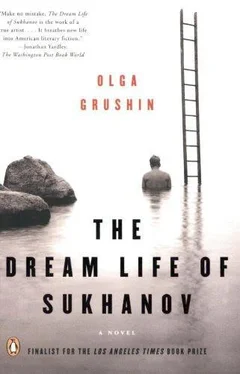Then a police siren exploded nearby. Someone must have called to complain about public disturbance tinged with religious propaganda. The illusion of the church vanished. Windows went out one by one, and clicking, shutting, banging noises echoed and reechoed through the courtyard. The singing wavered, then stopped abruptly in the depths of the apartment below, and they heard the faint sound of a woman weeping. Nina winced and walked back inside; he followed, closing the balcony door behind him. The crying grew indiscernible.
“I hope I can fall asleep after all this,” he said. “What time is it?”
“Five past four,” she replied, sliding back under the covers, and added with a sigh, “How sad that must be…. Poor girl!”
“Your poor girl probably cheats on him left and right,” he said unpleasantly. “Where there’s smoke, there’s fire.”
She looked at him with silent reproach and switched off the light.
He was about to retire as well, when some odd association reminded him he had a small matter to attend to. Murmuring that he would be back in a moment, he made his way to the study (in the process tripping over his slippers, which for some reason lay sprawled just past the threshold). The painting on the wall was illuminated, as before, by the yellow light of the streetlamp, but gazing at the swan sat the tremulous black-haired Leda—not in the least like the serene blonde Nina, of course.
His arms around the frame, Sukhanov carefully began to push it upward, maneuvering to slide the painting off its hook. When it was freed, he carried the heavy canvas out into the hallway, tiptoed past the bedroom, past the arched entryway to the living room, past the velvet magnificence of the dining room, past the doors that led into his children’s mysterious lives, and onward, through the kitchen, and to a cramped closet. There he released his burden and, smiling with satisfaction, watched as Leda slid along the wall and settled in the shadows, looking rather forlorn among all the mops and shoes and discarded stuffed animals and who knew what other neglected, unloved things that crowded inside this dim space with its damp smell of oblivion. But as his eyes lingered on the painted girl’s slim waist, narrow shoulders, stretched-out neck, her whole long-legged, warm, softly gleaming shape, he felt an unwanted trembling in his chest, as if in an unguarded moment or a careless dream some particle of his soul had accidentally caught a whiff of a real, if fleeting, resemblance—or perhaps not so much an actual resemblance as an overall familiarity, a certain congruence of moods, a spiritual likeness to something, to someone…
And then, all at once, a monstrous birth took place in his innermost, darkest depths. He sensed a repulsive, slimy, impossible creature stirring, stretching, rising sluggishly from its murky abyss, already twisting his insides, almost ready to trespass into his mind, to poke its ugly snout onto the surface of his thoughts—and he feared that once the snout broke through, the poisonous words of his premonition would be released, and there would be no taking them back, and he would have to face the possibility that all these many years ago Lev Belkin had… had…
“What nonsense,” said Sukhanov promptly, perhaps a bit louder than was advisable in the sleeping house, and slammed the closet door shut.
The floor reverberated with his decisive steps as he marched back to the study. There he threw open a cabinet, rummaged through its obscure contents, and finally unearthed a small still life, already framed. Forcefully humming the duel aria from Onegin, he installed it on the orphaned wall and stepped back to consider. His father-in-law’s perfectly round, red apples shone in an abundant pile on a yellow ceramic dish. The overall effect rather pleased him—and even more important, the bright cheerfulness of the composition turned out to be conducive to his productivity, as he discovered the very next day, when, the unpleasantly turbulent night shrugged away, the disappearance of Leda left without comment, the city stretching cloudy and still below his window, he sat at his desk, sipping his morning coffee, wrapped comfortably in his robe, and mused over the article.
The article presented a curious problem.
Sukhanov felt for a bookmark in a tattered volume on his desk, opened it, and reread the underlined conclusion to a chapter: “Surrealism can thus be rightfully called a betrayer of the people, locked as it is in deadly opposition to all humanistic values and traditions. It cherishes madness and cultivates decadent indifference toward social good. Its sickening visions strive to drive a healthy man into the realm of fantasy, distracting him from the noble goal of combating world capitalism. Therefore, as a movement it has nothing of value to offer to the mature artistic perceptions of the Soviet people. Moreover, some of its more harmful elements, such as its obsessions with horror and pornography, represented most fully in the work of Salvador Dalí…”
He shut the book and regarded the distinguished gray of the cover, on which the indented letters of the author’s name—his own—glittered dully with fading golden print. Then, frowning thoughtfully, he pushed the volume aside. Though published in 1965, his monograph on Western art served him still as an inexhaustible source of assertions that could be reused on most occasions, with only minor rephrasing and retouching; this time, however, he felt certain that something else—something, in fact, quite different—was expected.
As a rule, Sukhanov no longer wrote any articles himself: at his level of importance, creation had by necessity sunk to the bottom of his list of priorities. He was content with regulating the general flow of things—supervising the obsequiously smooth workings of his staff, distributing a monthly set of preselected themes among a trusted handful of critics, then poring through their texts to weed out a few chance occurrences of names better left unmentioned or to nudge two or three carelessly straying phrases back into the herd. He prepared each glossy, pleasantly substantial issue of Art of the World according to the same simple yet unfailing recipe: Take a doughy theoretical discourse on the methods and principles of Revolutionary art, stuff it with two or three well-seasoned essays portraying Repin and Fedotov as precursors of socialist realism and Levitan as an enemy of tsarism, mix in a sugarcoated biography of a famous Soviet master in the vein of Malinin and a spicy discovery of some unjustly ignored genius of the Italian Renaissance who was vilely persecuted by the Church, whisk in, for a bit of exotic flavor, an interview with this or that diamond-in-the-rough from a remote Asian republic (whose artistic development was clearly born of the wonders of Soviet education), and finally, generously pepper the whole with quotations from Marx and Lenin. Above all, Sukhanov was famous for his skillful omissions. While he would occasionally allow a cautious account of some contemporary Polish or Bulgarian artist (who invariably celebrated in his canvases the wonderful friendship blossoming between his and the Soviet people), Western art of the present century wandered through the pages of the magazine like a mildly embarrassing hallucination—a mute, befuddled, miserable ghost who was ridiculed, kicked, and exorcised, but whose name was never pronounced and whose face was never revealed.
This state of affairs had existed unchanged for years, from the day Sukhanov had first assumed the reins—and until a routine staff meeting one month ago. At that meeting, Sergei Nikolaevich Pugovichkin, the assistant editor in chief and Sukhanov’s second-in-command, had let slip a disturbing rumor that had somehow filtered through the ranks. It appeared that somewhere in the celestial above, certain nebulous changes had been transpiring ever since the ascension of the new Party leader in March, and among other things, a Very Important Someone (who, naturally, remained unnamed) had been overheard expressing the hope that Art of the World might begin dedicating at least one article per issue to a “prominent Western artist,” starting, for instance, with Salvador Dalí—for, as that enigmatic personage had been reputed to observe, “Dalí’s as good as anyone, and one must start somewhere.” Trying not to betray the shock he had felt at the idea of Dalí’s melting clocks making an appearance in the pages of his magazine, Sukhanov had shrugged nonchalantly and announced that he might as well tackle the subject himself. He was, after all, universally acknowledged as the foremost expert in the field.
Читать дальше








![Theresa Cheung - The Dream Dictionary from A to Z [Revised edition] - The Ultimate A–Z to Interpret the Secrets of Your Dreams](/books/692092/theresa-cheung-the-dream-dictionary-from-a-to-z-r-thumb.webp)



